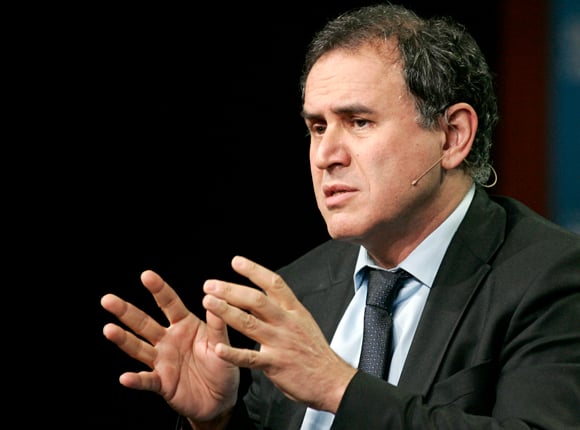Economist Nouriel Roubini says there's no chance for a swift economic turnaround. In fact, he says a recovery, if it happens, will actually feel like a recession. Given that scenario, Dr. Doom thinks the U.S. greenback may be a better bet than gold.
New York University Professor Nouriel Roubini said the dollar, the yen and the Swiss franc may be a better investment than gold if the world economy slips back into recession.
“If there was a double-dip recession, increasing risk aversion, some assets are going to be preferred, and gold will be one of them,” Roubini said today in an interview on Bloomberg Television's On The Move with Francine Lacqua. “But in that situation, things like the dollar, the yen, the Swiss franc have more upside in a situation of rising risk aversion because they are much more liquid than the gold market.”
Investors are dashing to hold securities deemed to be among the most secure in a slowdown as evidence mounts that the U.S. rebound from the worst recession since World War II is running out of steam. The Swiss franc rose to a record against the euro on Aug. 31 and the yen last month reached to its strongest level against the dollar since 1995.
The price of gold has risen 14 percent this year and traded at $1,252.25 an ounce as of 9:06 a.m. in London.
‘I believe that gold is going to trade around current levels,” Roubini said. “There are two extreme events that lead to a spike in gold. One is inflation, but we have no inflation in advanced economies. If anything, there is a risk of deflation.”
“The other event in which gold prices go up is the risk of a global financial meltdown, and that tail risk has been reduced because we backstopped the financial system,” he said.
Headwinds
Roubini, who forecast the U.S. recession more than a year before it began, today predicted that the U.S. economy is set to slow in the second half of the year as “tailwinds” such as fiscal stimulus and inventory adjustment become “headwinds.”
“We can try to prevent double-dip recession, but the idea we are going to have rapid recovery of growth to potential in advanced economies -- U.S., Europe, Japan -- is mission impossible,” he said.
U.S. employment growth probably cooled in August and the expansion in the services industry slowed, according to Bloomberg News surveys for reports to be released later today.
Private payrolls rose by 40,000 in August after a 71,000 July gain, and the jobless rate climbed to 9.6 percent, according to the median estimate of economists surveyed by Bloomberg News. Total employment may have dropped for a third month. The report is scheduled for 8:30 a.m. New York time.
“Job creation is going to be very, very mediocre,” he said in Cernobbio, Italy. “It's going to feel like a recession even if we're not in a recession.”
‘Bad News'
Roubini also said the underlying problem is that developed- economy debts need to be reduced, which will take time and require an extended period of slow growth, he said.
Also speaking from Cernobbio, Harvard University historian Niall Ferguson said the global economy remains plagued by the trade imbalances that helped trigger the financial crisis and that U.S. consumers are not going to provide the engine of the growth.
“If global imbalances caused this crisis, the bad news is they're back,” he said. “The short answer is that nothing is going to replace the U.S. consumer in the short term.”
He agreed with Roubini that growth in developed economies will remain lackluster, and said that the U.S. in particular risks stuttering if President Barrack Obama's leadership becomes hampered in the months ahead if the Democratic Party loses control of Congress.
“There are big political storm clouds gathering in the U.S.,” Ferguson said. “That's very bad news for the prospects of the Obama presidency. What we see now is a period of very depressed growth in the developed world.”







